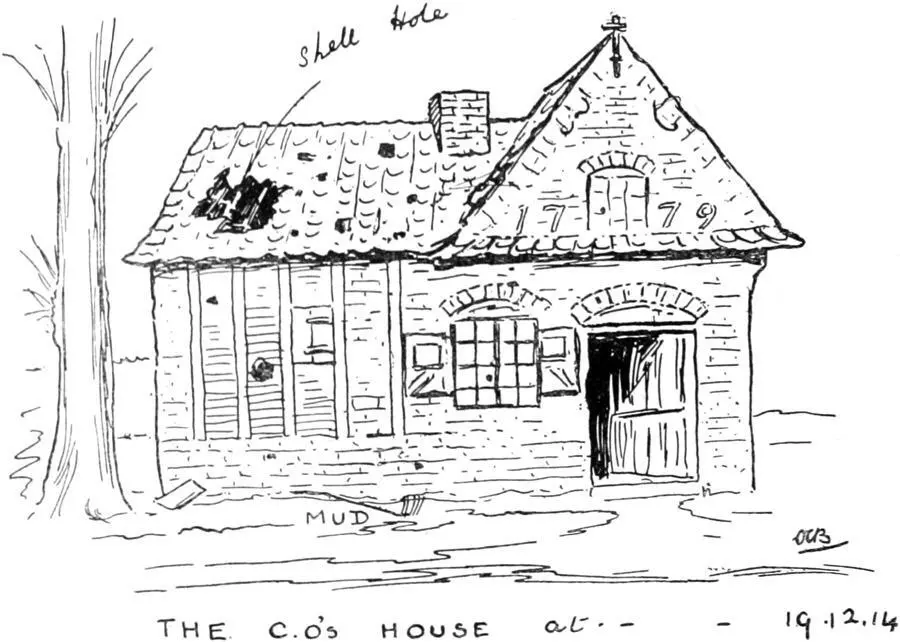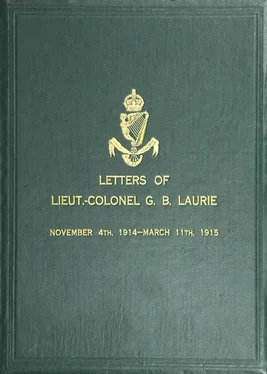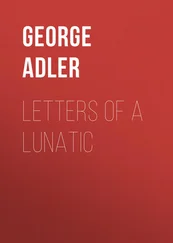George Laurie - Letters of Lt.-Col. George Brenton Laurie
Здесь есть возможность читать онлайн «George Laurie - Letters of Lt.-Col. George Brenton Laurie» весь текст электронной книги совершенно бесплатно (целиком полную версию без сокращений). В некоторых случаях можно слушать аудио, скачать через торрент в формате fb2 и присутствует краткое содержание. Город: Aldershot, Год выпуска: 1921, Издательство: Gale & Polden, Ltd, Жанр: Биографии и Мемуары, prose_military, на английском языке. Описание произведения, (предисловие) а так же отзывы посетителей доступны на портале библиотеки ЛибКат.
- Название:Letters of Lt.-Col. George Brenton Laurie
- Автор:
- Издательство:Gale & Polden, Ltd
- Жанр:
- Год:1921
- Город:Aldershot
- ISBN:нет данных
- Рейтинг книги:5 / 5. Голосов: 1
-
Избранное:Добавить в избранное
- Отзывы:
-
Ваша оценка:
- 100
- 1
- 2
- 3
- 4
- 5
Letters of Lt.-Col. George Brenton Laurie: краткое содержание, описание и аннотация
Предлагаем к чтению аннотацию, описание, краткое содержание или предисловие (зависит от того, что написал сам автор книги «Letters of Lt.-Col. George Brenton Laurie»). Если вы не нашли необходимую информацию о книге — напишите в комментариях, мы постараемся отыскать её.
Letters of Lt.-Col. George Brenton Laurie — читать онлайн бесплатно полную книгу (весь текст) целиком
Ниже представлен текст книги, разбитый по страницам. Система сохранения места последней прочитанной страницы, позволяет с удобством читать онлайн бесплатно книгу «Letters of Lt.-Col. George Brenton Laurie», без необходимости каждый раз заново искать на чём Вы остановились. Поставьте закладку, и сможете в любой момент перейти на страницу, на которой закончили чтение.
Интервал:
Закладка:
I do not think any of us can get away on leave at present, and if we could, I hardly like leaving the men in the trenches.
G.B.L.
We are at present apparently preparing for some adventure or other! One never knows how these affairs will turn out. This is indeed the most trying of wars; our life is one of incessant fighting. My experience of last night will illustrate the sort of thing that goes on. I wanted to go round my trenches, but a party of recruits came in just at that time; one was hit on the road half a mile back. He, poor fellow! was taken to hospital, and will probably be in England within ten days of leaving it. So I saw them away, and started to follow them up. I then dived down into a ditch and staggered along, my boots covered with foul mud and water, whilst a sniper commenced to try and take the trench I was in; enfilade it, they call it. Well, I went farther on up the ditch, getting worse and worse into the mire right over my knees. The mud actually worked its way through my leggings to my skin. I wandered on, heavy sniping hissing over my head or into the parapet, covering me with clay occasionally. Of course, everyone who lives in these particular trenches has wet feet day and night. Having been round and talked to everybody and done my best to cheer them up, I met and had a word with Capt. Rodney. He remarked: “Do not stay where you are, sir, I beg of you, for my servant was shot and killed just on that spot, and another man was wounded by the same bullet.” It went clean through a book that the unfortunate man was reading. So I discreetly toddled, or rather waded, home about midnight. This morning one of my men was shot through the lungs, not far from our room, and he died at once. This just shows you what a time we go through here, always having to keep our eyes open! Poor Capt. Whelan was killed, I saw in yesterday’s paper. He had been lent to the Royal Irish Regiment. Well, good-bye….
This morning your kind present of ginger cake, plum pudding, and mittens, also soap, arrived, for all of which many thanks. You will be interested to hear what was going on last night, which I did not like to tell you at the time I was writing. We had been summoned in the morning to receive the General’s order for an attack on a trench by the Rifle Brigade. The real attack, however, was to be made by someone else on quite another part of the line. We were to demonstrate. Well, if you ever heard Hell let loose, it was whilst I was writing that letter. Probably over fifty guns took part in it, and the firing was quite close overhead. It may have been 100 guns really—some very heavy ones. Then about 10 miles of trenches were blazing away at the Germans, and they were blazing back at us. Bullets were racing through our roof, and there I sat in a little room, shivering with cold for we could light no fire. I was not allowed to go into my firing line, but sat near the two telephones connecting me with the Artillery and with my own Regiment. A reinforcement of some Territorials was sent to help us. We finished up by capturing the trenches and also some prisoners, while the Rifle Brigade then went off to the trench that they visit occasionally, and there found a German who had been dead for about a fortnight. This was the net result of the little engagement; but it was very long drawn out at the time. In the morning, when the troops returned, the Germans caught the company moving with shell, and only that Major Baker and myself flew for our lives and hurried people about, we should have lost a lot. I have seldom used worse language! It had its comic side, too, for several of the men got so frightened that they fell into a cesspit in trying to take cover, and two were knocked over and wounded. It is very nasty having shell whistling over your head and bursting all around. At the present moment our batteries have opened again, but nothing like the business of last night. Two more of my fellows were badly hit at the same time, and I had to send a man to give them morphia while awaiting the doctor. Another near squeak was a bullet striking beside me from a glancing shot where I was standing, as I thought, in absolute safety. I am enclosing you a letter from Mrs. Allgood; she is a plucky woman. I had a very nice letter from Sir J—— R—— The bombardment of Scarborough was a cruel affair. Now the country will have to see it through….

I have made a great effort, as I cannot draw, to produce a Christmas card for you; it is the house (?) that the Colonel and I live in! Very old, and much knocked about by a shell in part of the roof, and bullet holes through it and both the windows, as I have endeavoured to show. In times of peace it is a very small public house, 3 rooms and a garret in which I live. The Colonel is very well, and seems to enjoy plodding knee-deep through the mud in the trenches. The Germans roused us this morning by dropping pieces of shell on our little house. We have just lunched off a most excellent turkey which you sent; it was splendid.
I hope men do not get mud fever like horses; if so, we ought to do so!
I trust that the war will have come to an honourable end before many months, and that we may all meet again.
With very best wishes for 1915.
Yours very sincerely,
W. Clinton Baker.
I heard that our people of the 2nd Battalion were driven out of the trenches by bombs from the Germans, with a loss of 8 officers and 200 men, but that may be one of the many yarns always spread about this sort of show. We have just this moment received a report that an attack is expected on us towards 4 p.m. It is now after 3 o’clock, and we have had to hurry indeed to get things ready. This morning, after our standing to arms, which always takes place at five o’clock, the Germans opened on us with heavy and moderate guns. The first shell sent the fuse through my roof, the next knocked a brick in at the side of the wall, and then I jumped out and started putting the men into covered ditches. We had between 50 and 100 shells thrown at us within three-quarters of an hour, but fortunately no one was hit. All the time, of course, rifle fire went on as usual. Such was our Advent Sunday’s amusement, and the shelling continued intermittently during the whole of the morning. Our trenches are a perfect bog; I shall find some difficulty in getting round them to-night even if we are not driven out of them. As to the shelling of the East Coast, you should see what these places look like after the enemy gets through with them, for their guns (howitzers) fire nearly as large shells as warships do from their guns. The man who brought the message to me was blown off his bicycle as he came along by four shells bursting and knocking down two or three houses beside him, two miles to the rear of us. Life is too awful for description out here now, and the men feel desperate at times. Whether the Germans are equally badly off I do not know, but there is little doubt that they must be; still, they are such a disciplined nation that it is difficult to see where the first break will come, excepting that as Germany consists in reality of several nations put together, the smaller ones may think it worth while to break off from the Empire and to make terms for themselves. My opinion is that Hungary will shortly do this. By the way, what we thought was another plum pudding turned out to be your turkey, and it was voted the best one we ever tasted! Many thanks for it and the pheasants, which also arrived this morning….
Читать дальшеИнтервал:
Закладка:
Похожие книги на «Letters of Lt.-Col. George Brenton Laurie»
Представляем Вашему вниманию похожие книги на «Letters of Lt.-Col. George Brenton Laurie» списком для выбора. Мы отобрали схожую по названию и смыслу литературу в надежде предоставить читателям больше вариантов отыскать новые, интересные, ещё непрочитанные произведения.
Обсуждение, отзывы о книге «Letters of Lt.-Col. George Brenton Laurie» и просто собственные мнения читателей. Оставьте ваши комментарии, напишите, что Вы думаете о произведении, его смысле или главных героях. Укажите что конкретно понравилось, а что нет, и почему Вы так считаете.












